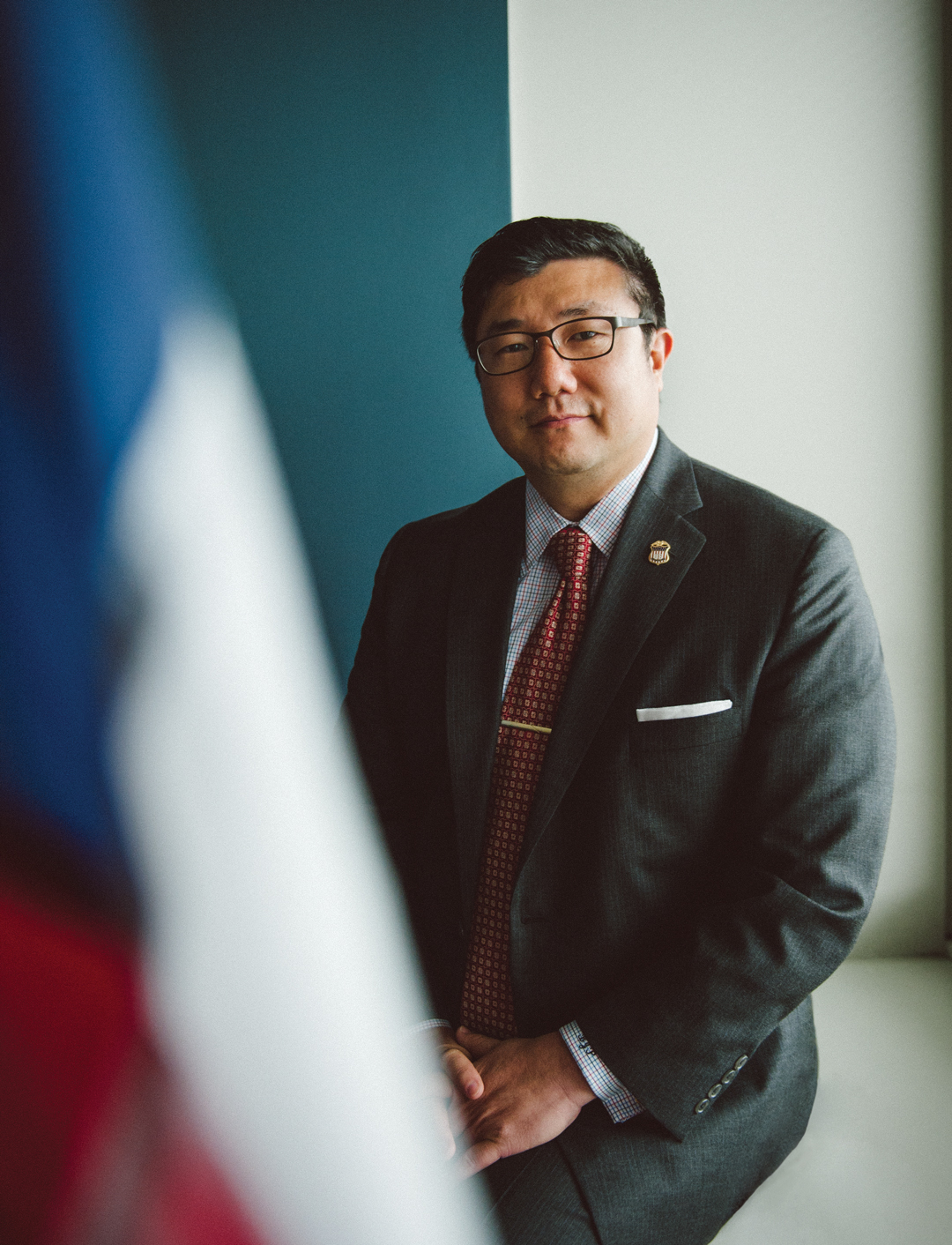
Photograph by Patrick Kolts
Former federal prosecutors have a tendency to talk wistfully about their days making cases against bad guys, the full might of the U.S. government behind them.
“You represent the people of the United States,” says BJay Pak, who worked as an assistant U.S. attorney from 2002 to 2008 in the northern district of Georgia, an area that spans 46 counties including metro Atlanta. “We’re about the mission, not the politics. And once you get some discretion and power in making those choices that impact people directly in their lives, there’s great satisfaction in doing good and wearing the white hat.”
But the biggest white hat in any federal district is reserved for the U.S. attorney, who is appointed by the president, confirmed by the U.S. Senate, and answers to the U.S. attorney general. In the northern district of Georgia, the U.S. attorney oversees approximately 105 federal prosecutors and decides what cases they pursue and what cases they leave to local authorities, acting as a kind of supercop—the political appointee who is, in theory anyway, above politics.
“While I am in full agreement that being assistant U.S. attorney is the best job you’ll ever have, being the U.S. attorney might be the most fulfilling and the most enjoyable,” says John Horn, who left the office last fall after 15 years, the last two of which were as U.S. attorney. Horn passed the reins to Pak, a Trump appointee who became the 26th U.S. attorney for the northern district of Georgia, overseeing the very office where he once worked.
“This was my dream job,” Pak says from his sixth floor office at the Richard B. Russell federal building, Mercedes-Benz Stadium looming out the window. Pak’s career path was influenced greatly by the events of 9/11, which he witnessed from his office at Alston & Bird in Atlanta. The panic and terror of that day galvanized him. “When you’re an immigrant”—Pak emigrated from South Korea when he was 9—“you view the United States as invincible,” he says. “You never imagine that somehow it would be shaken to its core.”

Photograph by Patrick Kolts
The job as a prosecutor followed 9/11, then three terms as a state representative. As U.S. attorney now, Pak wields a tremendous power, able to marshal vast resources to fight crime. To some degree, he is beholden to Department of Justice priorities—in the Trump administration, violent crime and the opioid epidemic—but beyond those, Pak is free to direct his office as he sees fit. Pak’s own agenda includes fighting cybercrime, healthcare fraud, and public corruption, all areas that are of no surprise to Horn, now a partner at King & Spalding. “I think these are all entirely appropriate,” Horn says.
Every U.S. attorney must be nimble, responding to the evolving nature of crime in their district. For instance, Pak says, half of the violent crime in his office’s 46 counties is gang-related. In addition to homegrown groups, national gangs—such as the Gangster Disciples from Chicago and Crips, Bloods, and their subsets—are increasingly co-opting local gangs, Pak says. Thanks to organized crime statutes, federal courts are especially well-suited to try gang members, Pak says. The nature of the federal prison system, as well, permits authorities to send them thousands of miles away to serve their sentences. “When you remove that person who is directing the violence in that area, it allows that community to heal itself,” he says.
By the numbers
105
Number of prosecutors working under Pak
46
Number of Georgia counties Pak’s office oversees
When it comes to illegal drugs, Pak says the bigger problem in the northern district is not opioids so much as cocaine and methamphetamine. Indeed, opioid-related deaths in Georgia in 2016 numbered 918, a rate of 8.8 deaths per 100,000 persons. Ohio, by contrast, saw 3,613 opioid-related overdoses in 2016, a rate almost four times that of Georgia.
“Methamphetamine is still the number-one trafficked drug in our district,” Pak says. “We have every Mexican drug cartel that has a cell here operating in a wholesale environment.” Today, there is a glut of crystal meth. A kilo with a street value of $25,000 in the mid-2000s now retails for half that. DEA agents have told him meth is so cheap and readily available that dealers are giving free samples away to get users hooked. “Frankly, no one’s really focused on that right now, because the nationwide discussion is focused on opioids.”
The most prominent open investigation Pak inherited from Horn is the longstanding corruption pay-to-play probe at City Hall under the Kasim Reed administration. So far, four defendants have pleaded guilty to various charges, ranging from conspiring to accept bribes (Adam Smith, the city’s former chief procurement officer) to attempting to obstruct a federal investigation (Shandarrick Barnes, a former city employee who threw a brick through a witness’s window and littered rats on the ground outside his home). In April, Reverend Mitzi Bickers pleaded not guilty to an 11-count indictment charging that she took $2 million in bribes to steer city business to at least two contractors.
Reed left office in January, and Pak acknowledges the ongoing investigation represents a cloud over Mayor Keisha Lance Bottoms’s new tenure. The two have not yet met formally, but he says Bottoms’s administration has moved faster than Reed’s in providing documents to the feds. So how long will the investigation take? Pak won’t say. “What I can tell you: It’s not going to last through the entire four years of the administration of Mayor Bottoms.”
Pak is looking to speed up the clock on the City Hall probe and many other cases. But, he says, it’s not about metrics. “What we’re going for is cases that have an impact in the community. I instructed people in our office . . . to be fearless, in the sense of, ‘Don’t fear that you’re going to lose a case.’ If it’s the right case, if it’s a risk that’s worth taking for the community, we need to do it.”
Update 8/15/18: This story has been updated to reflect Katrina Taylor-Parks pleading guilty in federal court to accepting bribes from a city vendor.”
This article appears in our August 2018 issue.












![The North Carolina Museum of Natural Sciences’ newest exhibit is a [pre]historic first](https://cdn2.atlantamagazine.com/wp-content/uploads/sites/4/2024/04/DD-3-100x70.jpg)


